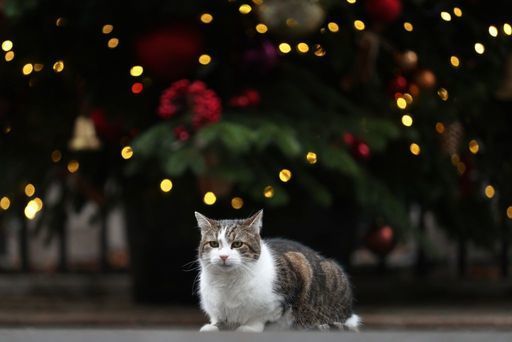Cats may have to be microchipped under new rules
Stray cats lost due to a lack of microchip include Larry, who was adopted from Battersea Dogs and Cats Home and is now Chief Mouser at 10 Downing Street

Your support helps us to tell the story
From reproductive rights to climate change to Big Tech, The Independent is on the ground when the story is developing. Whether it's investigating the financials of Elon Musk's pro-Trump PAC or producing our latest documentary, 'The A Word', which shines a light on the American women fighting for reproductive rights, we know how important it is to parse out the facts from the messaging.
At such a critical moment in US history, we need reporters on the ground. Your donation allows us to keep sending journalists to speak to both sides of the story.
The Independent is trusted by Americans across the entire political spectrum. And unlike many other quality news outlets, we choose not to lock Americans out of our reporting and analysis with paywalls. We believe quality journalism should be available to everyone, paid for by those who can afford it.
Your support makes all the difference.Compulsory microchipping for cats could be introduced in England next year as a two-month-long consultation on the proposal begins.
The consultation, which begins on 23 December, will hear from vets, owners and members of the public, with an earlier call for evidence by the Department for Environment, Food and Rural Affairs (Defra) showing 99% of people supported making microchipping of cats mandatory.
Animal welfare charity Cats Protection estimated 2.6 million cats in the UK - around 26% - are not microchipped.
Cats Protection reported that eight out of 10 stray cats handed into its adoption centres in England during 2018 were unchipped, leading to longer and sometimes unsuccessful efforts to reunite them with their owners.
Stray cats lost this way include Larry, the brown and white tabby who was found in London without a microchip and taken to Battersea Dogs and Cats Home before being adopted as Chief Mouser to 10 Downing Street and the Cabinet Office.
Cats Protection's chief executive James Yeates said: "Having a microchip gives a lost cat the best chance of being quickly reunited with their owner.
"We regularly hear heartwarming stories of the huge joy and relief when a missing cat is returned home thanks to the details of their microchip."
The British Veterinary Association has stated that the benefits of microchipping cats include; easier identification and subsequent arrest of owners culpable of animal cruelty, swift tracing and identification of animals in the event of a disease outbreak, and quicker identification of injured cats.
Battersea Dogs and Cats Home's deputy chief executive Peter Laurie said: "We see strays being brought to us every day, many of which have clearly been much-loved pets that have perhaps just wandered too far from home.
"Unfortunately we are often unable to trace their previous owners as they have either not been microchipped or the details on the chip are not up to date.
"We support compulsory microchipping of pet cats and we microchip every cat before they go to their new home."
Microchipping is the electronic tagging of an animal and was made compulsory for all dogs over eight weeks old in 2016. If an owner does not microchip their dog they are liable to a criminal conviction and face a fine of up to £500.
The microchips are very small - about the size of a grain of rice - and are inserted in the animal’s neck. This allows for details of the animal and their owner to be logged into a national database, meaning a lost pet can be easily reunited with their owner.
UK chief veterinary officer Christine Middlemiss said: "As we have seen already with dogs, compulsory microchipping is crucial in helping reunite owners with their treasured pets if they are lost or stolen.
"While the festive period is not the best time to introduce a new cat or kitten to your home and family if you do buy a pet over Christmas, then on top of making sure they are microchipped, I would advise people to ensure they have checked the readily-available advice on how you can buy your pet safely and responsibly."
Animal welfare minister Lord Goldsmith said: "These plans to make cat microchipping compulsory build on our actions to improve our already world-leading animal welfare standards, including taking steps to end live animal exports and ban the practice of keeping primates as pets."
2019 saw 29,432 cats received by RSPCA shelters, more than double the amount of dogs handed in that year.
The British Veterinary Association state that 50% of stray dogs cannot be reunited with their owner because they do not have an identifying microchip or tag.
Subscribe to Independent Premium to bookmark this article
Want to bookmark your favourite articles and stories to read or reference later? Start your Independent Premium subscription today.



Join our commenting forum
Join thought-provoking conversations, follow other Independent readers and see their replies
Comments